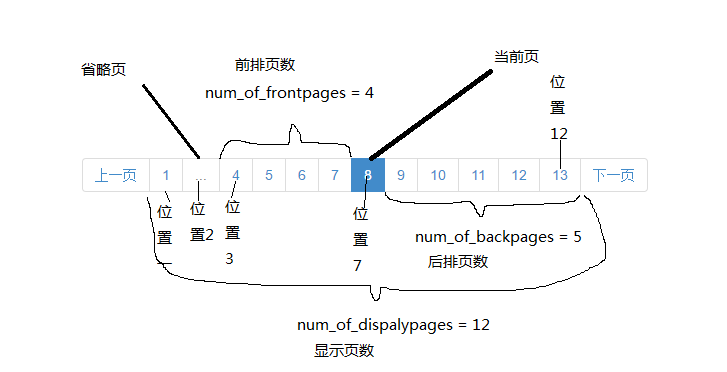效果演示:

github地址:https://github.com/mncu/django_projects/tree/master/django_projects/pagination_test

本例中总页数为30页,显示页数为12页,当前页的前排页数为4,后排页数为5
将分页分为三种情况:
1 当前页为第1页到第7页的时候,无省略页,且12个位置的内容是不变
2 当前页为第8页到第25页时,位置1与位置2内容不变,当前页一直处于位置7,
3 当前页为第25页到第30页时,位置1与位置2内容不变,位置8到位置12的内容不变,当前页在位置8到位置12之中变换
自定义标签代码:
|
1
2
3
4
5
6
7
8
9
10
11
12
13
14
15
16
17
18
19
20
21
22
23
24
25
26
27
28
29
30
31
32
33
34
35
36
37
38
39
40
41
42
|
register = template.Library()@register.assignment_tagdef pagination(current_page,paginator,num_of_displaypages=10,num_of_backpages=4): # current_page is a django.core.paginator.Page 's instance # paginator is a django.core.paginator.Paginator 's instance # num_of_frontpages = num_of_displaypages - num_of_backpages -3 html='' # 当总页数小于等于 显示页数 时,则将总页数全部显示 if paginator.num_pages <= num_of_displaypages : for i in range(1,paginator.num_pages+1): html+= '<li ><a href="?page=%s" rel="external nofollow" rel="external nofollow" rel="external nofollow" rel="external nofollow" >%s </a></li>'%(i,i) return html # 第一种情况 elif current_page.number <= num_of_displaypages-num_of_backpages: for i in range(1,num_of_displaypages+1): html+= '<li ><a href="?page=%s" rel="external nofollow" rel="external nofollow" rel="external nofollow" rel="external nofollow" >%s </a></li>'%(i,i) return html # 第二种情况 elif num_of_displaypages-num_of_frontpages <= current_page.number <= paginator.num_pages-num_of_backpages : html = ''' <li><a href="?page=1" rel="external nofollow" rel="external nofollow" rel="external nofollow" rel="external nofollow" >1</a></la> <li class="disabled"><a href="?page=1" rel="external nofollow" rel="external nofollow" rel="external nofollow" rel="external nofollow" >...</a></la> ''' for i in range(current_page.number-num_of_frontpages,current_page.number+num_of_backpages+1): html+='<li><a href="?page=%s" rel="external nofollow" rel="external nofollow" rel="external nofollow" rel="external nofollow" >%s</a></la>'%(i,i) return html # 第三种情况 else: html = ''' <li><a href="?page=1" rel="external nofollow" rel="external nofollow" rel="external nofollow" rel="external nofollow" >1</a></la> <li class="disabled"><a href="?page=1" rel="external nofollow" rel="external nofollow" rel="external nofollow" rel="external nofollow" >...</a></la> ''' for i in range(paginator.num_pages-num_of_backpages-num_of_frontpages,paginator.num_pages+1): html+='<li><a href="?page=%s" rel="external nofollow" rel="external nofollow" rel="external nofollow" rel="external nofollow" >%s</a></la>'%(i,i) return html |
来看html代码
|
1
2
3
4
5
6
7
8
9
10
11
12
13
14
15
16
17
18
19
20
21
22
23
24
25
26
27
28
29
30
31
32
33
34
35
36
37
38
39
40
41
42
43
44
45
46
47
48
49
50
51
52
53
54
|
{% load mytags %}<!DOCTYPE html><html lang="en"><head> <meta charset="UTF-8"> <title>Title</title> <!-- 新 Bootstrap 核心 CSS 文件 --> <link rel="stylesheet" href="http://cdn.bootcss.com/bootstrap/3.3.0/css/bootstrap.min.css" rel="external nofollow" > <!-- 可选的Bootstrap主题文件(一般不用引入) --> <link rel="stylesheet" href="http://cdn.bootcss.com/bootstrap/3.3.0/css/bootstrap-theme.min.css" rel="external nofollow" > <!-- jQuery文件。务必在bootstrap.min.js 之前引入 --> <script src="http://cdn.bootcss.com/jquery/1.11.1/jquery.min.js"></script> <!-- 最新的 Bootstrap 核心 JavaScript 文件 --> <script src="http://cdn.bootcss.com/bootstrap/3.3.0/js/bootstrap.min.js"></script></head><body>{{ current_page.object_list }} <nav> <ul class="pagination"> {% if current_page.has_previous %} <li ><a href="?page={{ current_page.previous_page_number }}" rel="external nofollow" >上一页 <span class="sr-only">(current)</span></a></li> {% endif %} {% pagination current_page paginator 12 5 as page_list %} <!-- 引用自定义标签,并传入参数 --> {{ page_list|safe }} <!-- 显示 --> {% if current_page.has_next %} <li><a href="?page={{ current_page.next_page_number }}" rel="external nofollow" >下一页 <span class="sr-only">(current)</span></a></li> {% endif %} </ul> </nav><script> $(document).ready(function(){ $('.pagination li a').each(function(){ if ( $(this).html() == {{ current_page.number }} ){ $(this).parent().addClass('active') } }); })</script></body></html> |
看看view函数:
|
1
2
3
4
5
6
7
8
9
10
11
12
13
14
15
16
17
18
19
20
21
22
23
24
25
26
27
28
29
30
|
from django.shortcuts import renderfrom django.core.paginator import Paginator, EmptyPage, PageNotAnInteger# Create your views here.def index(request): obj_list = ['page01','page02','page03','page04','page05','page06','page07','page08','page09','page10', 'page11','page12','page13','page14','page15','page16','page17','page18','page19','page20', 'page21','page22','page23','page24','page25','page26','page27','page28','page29','page30',] #create a paginator instance paginator = Paginator(obj_list,1) #Get the page_number of current page current_page_num = request.GET.get('page') try: current_page = paginator.page(current_page_num) except PageNotAnInteger: # If page is not an integer, deliver first page. current_page = paginator.page(1) except EmptyPage: # If page is out of range (e.g. 9999), deliver last page of results. current_page = paginator.page(paginator.num_pages) return render(request,'index.html', {'current_page': current_page, 'paginator': paginator }) |
以上就是本文的全部内容,希望对大家的学习有所帮助,也希望大家多多支持服务器之家。
原文链接:http://www.cnblogs.com/MnCu8261/p/5943609.html










